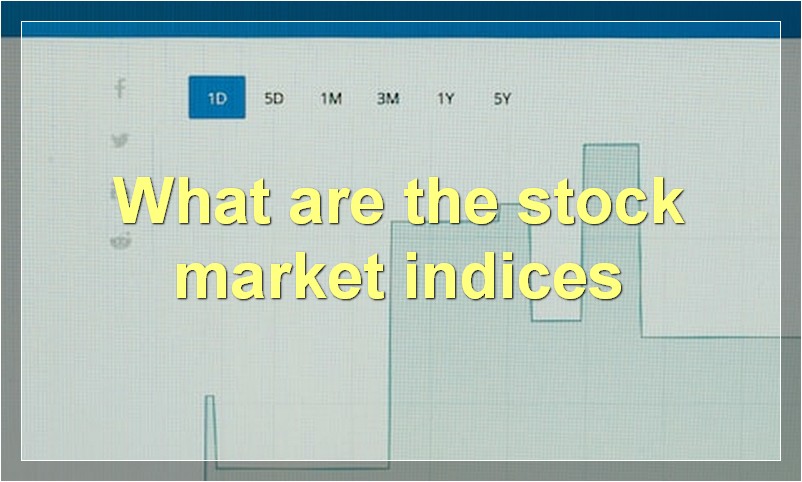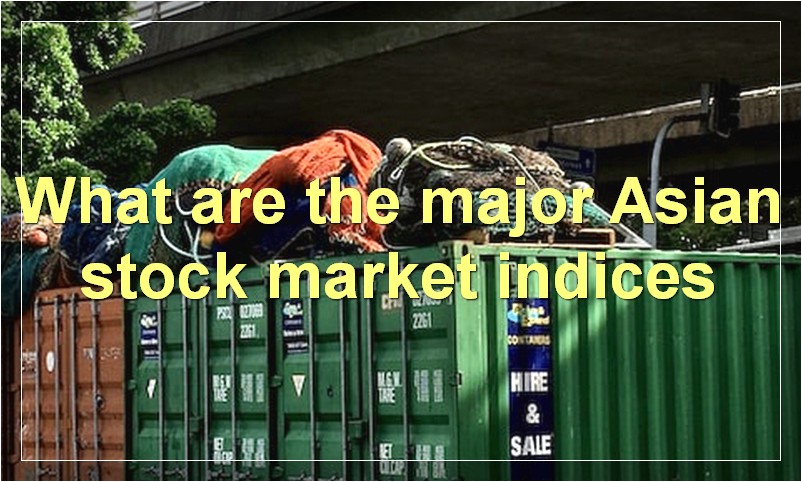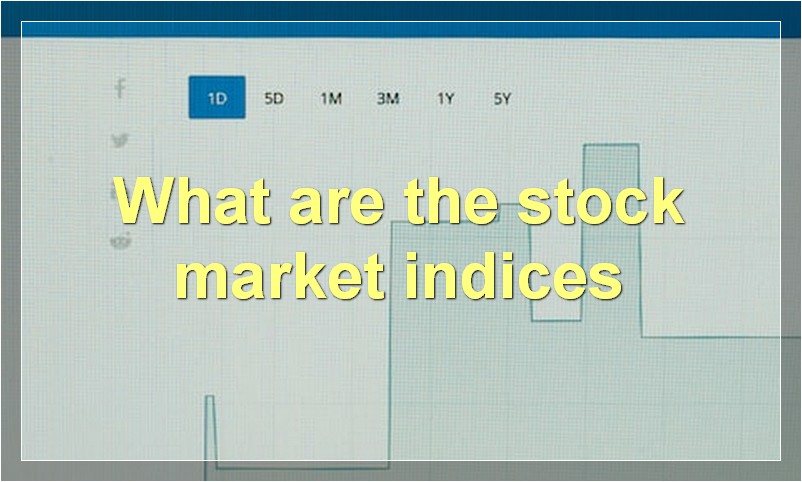What are the major world indices and how do they impact the economy?
What are the major world indices
What are the major world indices?
The major world indices are a group of the most important stock market indices around the globe. They include the likes of the Dow Jones Industrial Average (DJIA) in the United States, the FTSE 100 Index in the United Kingdom, the Nikkei 225 in Japan, and the S&P/ASX 200 in Australia.
These indices are important because they provide a snapshot of how the respective stock markets are performing. For example, if the DJIA is up, it means that stocks on the New York Stock Exchange (NYSE) are generally doing well. On the other hand, if the Nikkei 225 is down, it indicates that Japanese stocks are not faring as well.
The major world indices also give investors an idea of how different economies are doing. For instance, if the US stock market is doing well but Japan’s is not, it could be a sign that the US economy is stronger than Japan’s. This information can be useful when making investment decisions.
So, there you have it – a brief overview of the major world indices. Keep tabs on these numbers and you’ll get a good sense of how global stock markets are performing.
What are the stock market indices

Most people have heard of the stock market, and many have a vague understanding of what it is. The stock market is where investors buy and sell shares of publicly traded companies. When people talk about the stock market, they are usually referring to one of the major stock market indices.
The three most well-known stock market indices are the Dow Jones Industrial Average (DJIA), the Standard & Poor’s 500 Index (S&P 500), and the Nasdaq Composite Index. These indices are often used as a barometer for the overall health of the stock market.
The DJIA is made up of 30 large, publicly traded companies. The S&P 500 is made up of 500 large, publicly traded companies. The Nasdaq Composite Index is made up of over 3,000 publicly traded companies.
When the stock prices of the companies in an index go up, the index goes up. When the stock prices of the companies in an index go down, the index goes down. Investors use stock market indices to track the performance of the overall stock market.
Stock market indices can be a helpful tool for investors, but it’s important to remember that they are just a snapshot of the market at a specific point in time. They don’t tell the whole story.
What is the difference between a world index and a stock market index
A world index is an index of stocks from companies around the globe, while a stock market index is an index of stocks from companies within a particular country or region. While both types of indices can be used to measure the performance of the overall market, a world index provides a more global perspective. In addition, a world index can be helpful in identifying international opportunities and trends.
What are the major US stock market indices
The three major US stock market indices are the Dow Jones Industrial Average (DJIA), the Nasdaq Composite, and the S&P 500. The DJIA is the oldest and most widely-recognized index, and includes 30 blue chip stocks. The Nasdaq Composite is a technology-heavy index that includes over 3,000 stocks, and the S&P 500 is a broad-based index that covers 500 large cap stocks.
What are the major European stock market indices
There are a number of different stock market indices in Europe, each of which tracks the performance of a different group of stocks. The three major indices are the FTSE 100 index (which tracks the 100 largest companies listed on the London Stock Exchange), the German DAX index (which tracks the 30 largest companies listed on the Frankfurt Stock Exchange) and the French CAC 40 index (which tracks the 40 largest companies listed on the Paris Stock Exchange).
What are the major Asian stock market indices

When it comes to Asian stock market indices, there are a few that stand out. The first is the Nikkei 225, which is the index for the Tokyo Stock Exchange. This index is made up of the top 225 companies in Japan and is a good indicator of how the Japanese economy is performing. Another major Asian stock market index is the Hang Seng Index, which tracks the performance of companies listed on the Hong Kong Stock Exchange. This index is made up of 50 companies, so it gives a good overview of the Hong Kong market. Finally, there is the Shanghai Composite Index, which tracks the performance of companies listed on the Shanghai Stock Exchange. This index includes all of the companies listed on the exchange, so it gives a good overview of the Chinese economy.
What are the major world bond indices
A bond is an agreement between two parties in which one party, the borrower, agrees to pay a sum of money, the principal, to the other party, the lender, at specified intervals for a specified period of time. The periodic payments may be interest only, or they may include repayment of some or all of the principal. The principal and interest are usually paid at fixed intervals, usually semi-annually or annually.
The major world bond indices are the Bloomberg Barclays US Aggregate Bond Index, the JPMorgan Global Bond Index (ex-US), the Citigroup World Government Bond Index, and the HSBC World Government Bond Index. These indices are used to track the performance of the global bond market. They are widely followed by investors and market analysts.
The Bloomberg Barclays US Aggregate Bond Index is a broad measure of the US bond market. It includes government bonds, corporate bonds, mortgage-backed securities, and asset-backed securities. The index is widely followed by investors and market analysts.
The JPMorgan Global Bond Index (ex-US) is a measure of the global bond market excluding the US. It includes government bonds, corporate bonds, mortgage-backed securities, and asset-backed securities. The index is widely followed by investors and market analysts.
The Citigroup World Government Bond Index is a measure of the global government bond market. It includes government bonds from over 20 countries. The index is widely followed by investors and market analysts.
The HSBC World Government Bond Index is a measure of the global government bond market. It includes government bonds from over 30 countries. The index is widely followed by investors and market analysts.
What is the difference between a world index and a bond index
An index is a tool that investors use to measure the performance of a security or group of securities. A world index tracks the performance of stocks from companies located around the globe, while a bond index tracks the performance of bonds issued by governments and corporations.
The main difference between a world index and a bond index is the type of securities they track. World indexes track stocks, while bond indexes track bonds. Another difference is that world indexes are typically more volatile than bond indexes. This is because stocks are more volatile than bonds.
What is the difference between a stock market index and a bond index
There are a few key differences between stock market indices and bond indices. For one, stock market indices tend to be much more volatile than bond indices. This is because stocks are generally more volatile than bonds. This means that stock market indices will typically have higher peaks and valleys than bond indices. Another difference is that stock market indices are usually calculated using price data, while bond indices are often calculated using yield data. This is because bonds tend to be more interest rate sensitive than stocks. Finally, stock market indices tend to be more global in nature, while bond indices tend to be more regional.
What are the major world commodity indices
The major world commodity indices are the Bloomberg Commodity Index, the Thomson Reuters/Core Commodity CRB Index, and the S&P GSCI. These indices track the performance of 22 commodities including energy, metals, and agricultural products. Energy commodities make up the largest weighting in these indices, followed by industrial metals and then agriculture. The Bloomberg Commodity Index is the most widely followed of these indices and is used as a benchmark by many investors.

